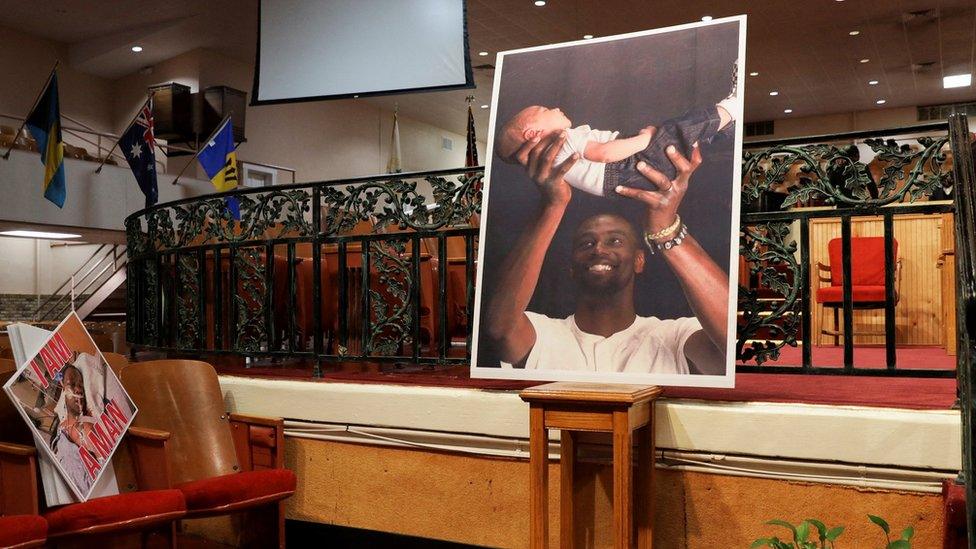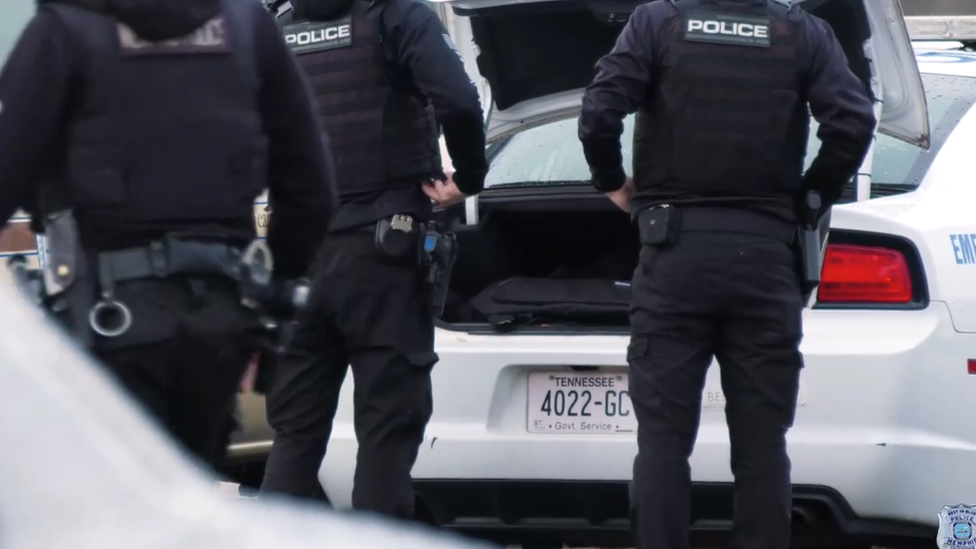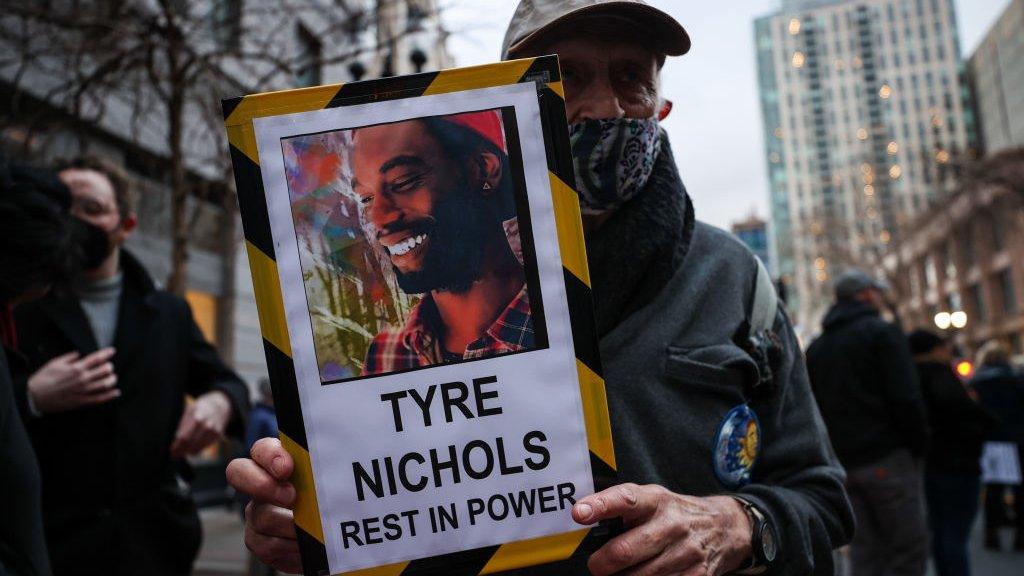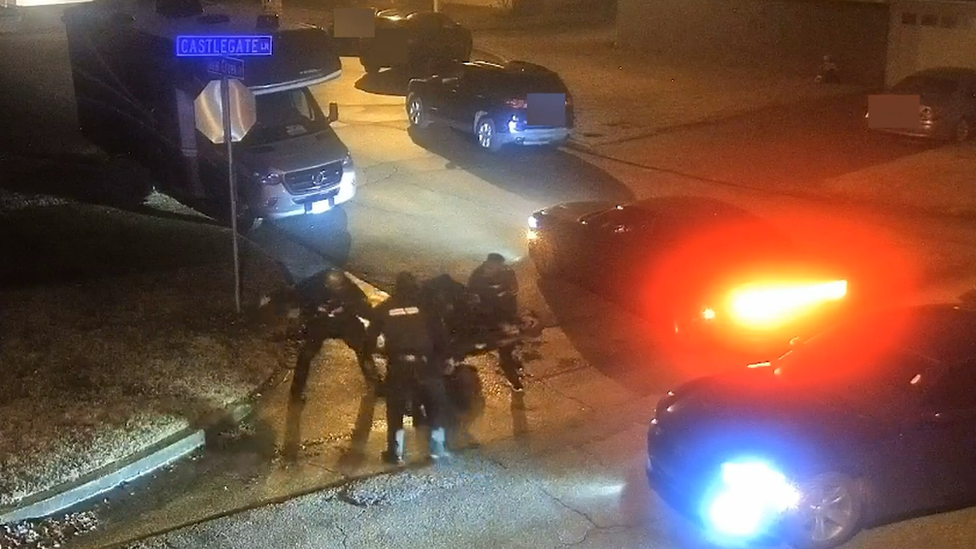Tyre Nichols: Memphis judge delays release of the arrest videos
- Published

Tyre Nichols, a 29-year-old black father, was fatally beaten by police during a traffic stop
A Tennessee judge has delayed the release of 20 hours of footage showing the police beating and arrest of 29-year-old black man Tyre Nichols.
The judge said the last-minute delay was due to the need to allow lawyers for five Memphis officers charged with his death to review the tapes.
Mr Nichols died in January three days after being pulled over by police.
On Wednesday, the US justice department said it would investigate the special police unit that arrested Mr Nichols.
The footage, due to be released by the Memphis Police Department on Wednesday, was blocked by Shelby County Criminal Court Judge James Jones Jr.
The city had planned to share information on the charges and disciplinary action some firefighters and police officers are facing as a result of the investigation, along with the 20 hours of footage, but those documents were also blocked.
In his order, the judge said that the footage is "in the public interest" and will be ready for release "as soon as practicable".
The Shelby County District Attorney's Office said in a statement that it has "trust that the appropriate decision has been made to protect the integrity of the ongoing investigation".
"We will work to review the material promptly in the hopes that the majority of it will be released sooner rather than later."
Previous body-camera footage of the encounter with Mr Nichols released in January showed police officers kicking, punching and firing a Taser at Mr Nichols for several minutes as he cried out for his mother.
But it did not show what led police to pull over Mr Nichols in the first place or what they told other responding officers and medics who arrived to treat him.
On 7 January, Mr Nichols had been returning home, and was stopped on suspicion of reckless driving - a claim that has not been substantiated, according to Memphis Police Chief Cerelyn Davis.
Mr Nichols' death sparked nationwide protests against police brutality in the US. The Department of Justice (DoJ) has already launched a civil rights investigation.
On Wednesday, the DoJ announced an investigation into the Memphis Police Department, the special police unit that arrested Mr Nichols - the Scorpion unit, which stood for "Street Crimes Operation to Restore Peace in Our Neighborhoods" - and other similar units in police forces around the country.
Special police units - which are common in major cities and are often used to crack down on street crime - have been criticised since Mr Nichols' death.
Five black members of Memphis's Scorpion Unit face second-degree murder and other charges for the killing of Mr Nichols. They have pleaded not guilty to the charges.
The 50-person unit, which had been accused on several other occasions of misconduct, has since been disbanded.
The DoJ said their probe will examine "certain policies and practices of the Memphis Police Department".
The review was requested by Memphis' police chief in the wake of Mr Nichols' death.
It will investigate the department's training, data and processes related to use of force, de-escalation and special police units, like the one involved in stopping Mr Nichols before his death.
"In the wake of Tyre Nichols's tragic death, the Justice Department has heard from police chiefs across the country who are assessing the use of specialised units and, where used, appropriate management, oversight, and accountability for such units," Associate Attorney General Vanita Gupta said.
The agency said it would share its findings and issue recommendations after the review is complete.
Seven police officers have so far been fired, while at least 13 officers in total are facing some form of discipline over the incident, according to Memphis chief legal officer Jennifer Sink.
Three emergency medical workers have also been fired for not providing Mr Nichols with adequate care.
On Tuesday, Memphis passed a series of new police reforms in the wake of Mr Nichols' death.
The new rules require police to use only marked patrol cars for traffic stops and strengthens the role of citizen review boards.
Related topics
- Published29 January 2023

- Published31 January 2023

- Published28 January 2023
